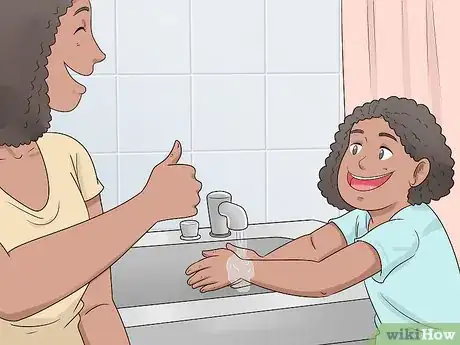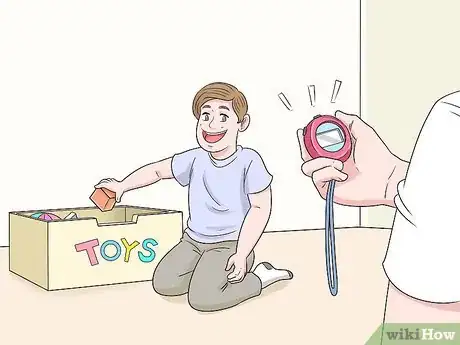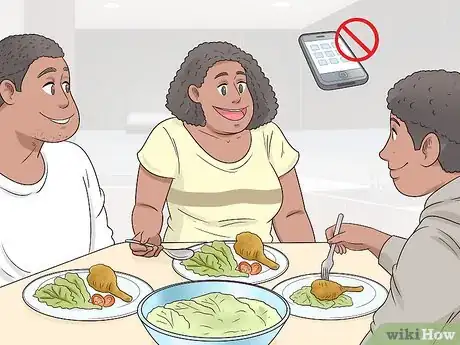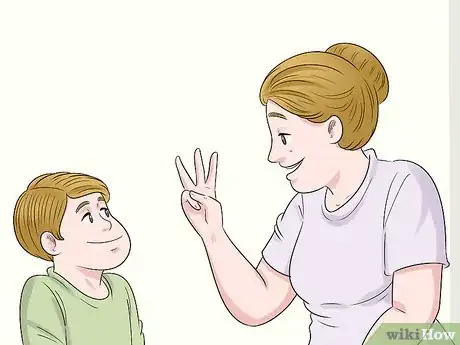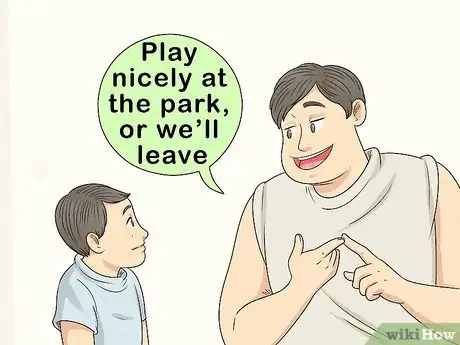This article was co-authored by Kathy Slattengren, M.Ed.. Kathy Slattengren is a Parent Educator and Coach and the Founder of Priceless Parenting. With over two decades of experience, Kathy specializes in helping parents build strong, loving relationships with their children. She has helped thousands of parents around the world through Priceless Parenting's online classes, presentations, coaching, and books. Kathy holds a Bachelor's degree in Computer Science and Psychology from The University of Minnesota and a Masters degree in Education and Instructional Design from The University of Washington. Kathy is a member of the National Parenting Education Network, the US Alliance to End the Hitting of Children, the International Society for Technology in Education, and a founding member of Parent Learning Link. Priceless Parenting has been featured on ABC News, Komo News, King 5 News, National PTA, Parent Map, and Inspire Me Today.
There are 12 references cited in this article, which can be found at the bottom of the page.
This article has been viewed 85,439 times.
All parents struggle with disobedient kids at some point, so don’t feel like you’re alone. Start by ensuring your rules are clear and specific. Warn your kids what will happen if they disobey and, if necessary, impose immediate consequences that relate to their misbehavior. While consequences can help correct misbehavior in the moment, you should also encourage good decisions with praise and small rewards.
Steps
Getting Younger Children to Listen
-
1Make eye contact and ask for a response when you provide instructions. When younger kids are busy playing, they tend to tune everything else out. If they’re not listening when you ask them to do something, they might not have heard you. Instead of shouting a command across the house, kneel down to their level, look them in the eye, and state your instructions.[1]
- For instance, get on their level and say, “It’s time for lunch. Go wash your hands and come to the table.”
- Try stating 1 instruction at a time. Ask the child to repeat back what you said to them. This can encourage them to listen and respond appropriately.
-
2Praise good behavior as much as possible. Usually, positive reinforcement is a more effective way to promote good behavior than merely imposing punishments. Thank and praise them for making good decisions at every opportunity. You can also offer small rewards, such as toys or sweets in moderation, to reward them for following directions.[2]
- Reward charts are also helpful for promoting good behavior. If they’re supposed to take the garbage out every day, put a gold star on a calendar for every day they do so without having to be told. After a week of gold stars, they get a small toy.
Advertisement -
3Give short, simple commands instead of long lectures. You probably know all too well that kids tune out long-winded speeches after a few words. Try using just 1 or 2 words when you have to issue a command, remind them of a chore, or redirect their behavior.[3]
- For example, instead of spending 5 or 10 minutes describing how they never brush their teeth when they’re told, say, “Teeth, now.” If they’re supposed to put away clean plates from the dishwasher, just say, “Plates,” instead of lecturing them about doing their chores without being asked.
- Note that a short explanation is helpful when introducing rules. When you're giving a command or reminding them to do something, try sticking to just 1 or 2 words.
-
4Try turning chores into games. Turning tasks into a challenge or game can be an effective way to get stubborn kids to obey instructions. If your preschooler never puts away their toys, try setting a timer and challenging them to a game.[4]
- Say, “Bet you can’t put away all these toys before the buzzer goes off!” or “Let’s see how many toys you can put away in 2 minutes!”
- At the end of the challenge, give them a small prize to encourage them to play the clean up “game” in the future.
-
5Express empathy instead of yelling at them to stop crying. If your child isn’t listening because they’re throwing a tantrum, simply yelling at them to stop won’t help. Try to soothe them until they’re quiet enough to hear you speak. Then acknowledge their feelings and help them express their frustration using words.[5]
- Suppose your kid is screaming because a sibling took a toy away. Say something empathetic, such as “Well you seem very upset,” instead of, “Stop crying! There’s no reason to cry over this.”[6]
- After acknowledging their frustration, ask them why they’re upset. Ask, “How can we make this better?” and work together to come up with a solution. For instance, if their sibling took their toy, you could set a timer and have them take 5-minute turns.
- You could offer to give them a hug, or give them time alone.[7]
Dealing with a Defiant Teenager
-
1Set clear goals and rules, but negotiate the details with them. Teens obey rules more consistently when they have opportunities to voice their opinion. You should absolutely set the rules and have the final say, but let your teen make decisions about how and when to meet your goals.[8]
- For example, make sure they study and clean their room, but allow them to complete these tasks by a given time instead of right this minute. Say, “You have to clean your room, but you don’t have to do it right this minute. Just get it done by the end of the weekend.”
-
2Model positive behavior and follow your own rules. It might not seem like they pay attention, but teens look to your example even more than younger kids. If you don’t follow the family rules, you’re telling your teen it’s okay for them to break the rules, too.[9]
- For example, if you don’t want your teen to play on their phone during dinner, be sure to put away your own phone.[10]
- Even when your teenager is acting defiant and rude, avoid reacting emotionally. Do not yell, scream, or cry, as your teen might see this as a way to get your attention or they may use it to manipulate you. Instead, remain calm. Express your disappointment in a clear and even voice.
-
3Praise your teenager when they do something well. Positive reinforcement can help improve teenagers' self-esteem and encourage them to act more appropriately. Thank your teenager when they did some around the house, and let them know when you are proud of them.
- For example, if your teenager washes the dishes, say, "Thank you. That was a big help."
- If your teenager gets a good grade, you might say, "I'm really proud of you. I know you worked hard, and it paid off."
-
4Make natural, logical consequences your core disciplinary tools. Since they’ll soon be young adults, teens must learn how to hold themselves accountable for their actions. Without putting their health or safety at risk, consequences for disobedience should mirror what would happen if they made poor decisions as adults.
- Suppose your teen was texting on their phone and got into an at-fault fender-bender. Take away their car and, if they don’t have one already, have them get a part-time job to pay for repairs.
- You could also downgrade their cell phone plan to remove web access and texting, or get them a phone without these capabilities.
- Avoid rescuing your teenage when they encounter obstacles or difficulties. These can be valuable learning experiences for them. For example, if they lose their phone, don't give them a new one.
-
5Ensure your teen eats and gets enough sleep. Teens need food to fuel their tremendous growth rate, and they rarely get their recommended 9 to 10 hours of nightly sleep. If your teen is acting up, chances are they aren’t getting enough sleep or calories.[11]
- Be sure they have a healthy breakfast before they leave for school, like Greek yogurt with fruit or fortified cereal.
- Encourage them to go for nutritious options at the cafeteria, and help them prepare healthy lunches and dinners outside of school. Have them help you cook dinner, and teach them (or learn together) how to prepare healthy meals.
- Do your best to ensure they go to bed as early as possible, and have regular conversations about the importance of proper eating and sleeping habits.
Establishing Rules and Consequences
-
1Identify and explain clear, precise family rules. Instead of vague rules, such as “Be nice,” set specific rules, such as “No interrupting. Wait your turn to speak.” Additionally, providing a negative rule (“No interrupting”) followed by a positive instruction (“Wait your turn to speak”) lets your child know exactly what kind of behavior you expect.[12]
- Other examples include “No hurting. Keep your hands and feet to yourself,” and “No yelling in the house. Use your inside voice.”
- Make sure that the child understands what the consequences are ahead of time. If they misbehave, follow through with these consequences.
-
2Set consistent family rules with any co-parents. Consistent rules are essential, so make sure you and any co-parents act as a united front. If you and a co-parent enforce rules differently, try to come up with a compromise.[13]
- For example, suppose you work at night a few days a week. While you’re at work, your partner lets your kids stay up late. Tell your partner, “Our rules need to be clear and consistent, and a set sleeping routine is really important. If we’re not on the same page, the kids won’t follow our rules.”
- Consistency is very important for children as they grow up. Talk to the child's other parent, and explain how consistency helps avoid confusion for children. Make agreeing on compromise a priority.
-
3Introduce no more than 2 to 3 new rules at a time to younger children. Toddlers and preschoolers have trouble learning more than a couple rules at once. Explain 2 or 3 rules and apply them consistently for 1 to 2 weeks. Then introduce additional rules when your child shows that they understand the first set.[14]
- Rules fall into 3 priority levels. Safety is first (“No running with scissors”), followed by rules about not harming people or property (“No hitting,” “No breaking toys”), and rules related to polite or calm behavior (“No whining,” “No temper tantrums,” and “No interrupting”).[15]
-
4Let natural consequences teach your child lessons, within reason. Many undesirable behaviors cause bad things to happen, and these natural consequences are valuable teaching tools. Natural consequences help younger children learn about causes and effects, and teach teens how to make responsible, adult decisions.[16]
- For example, if a younger child breaks a toy, don’t replace it. They’ll learn that they’ll have nothing to play with if they break their toys.
- Natural consequences should never put a child’s health or safety at risk. Don’t let them run around with scissors to teach them a lesson or withhold food because they didn't wash their hands before a meal.
-
5Come up with reasonable consequences, if necessary. Sometimes, misbehavior doesn’t cause negative natural consequences. In these cases, you’ll have to impose your own consequences, such as a time-out or additional chores.[17]
- For instance, if your child steals a toy from a sibling or friend, have them write an apology letter and do chores to make amends. If they make an allowance, withhold it so their chores go to paying off the value of the item they stole.
- When you put your child in time-out, sit them down in a “naughty chair,” ignore them completely, and ensure they can’t access any form of entertainment. Don’t send them to their room, as they’ll have access to their toys, games, and other fun belongings.
- Always explain to your child how the consequences were a result of a choice that they made. Discuss what a better choice would have been and how they could have avoided this consequence.
-
6Offer your kids choices when you warn them about consequences. Merely threatening kids with punishment can encourage defiance. Instead, propose the correct decision, then warn them what will happen if they don’t make the right choice. Use this strategy for both natural consequences and for consequences you impose.[18]
- For example, say, “Don’t play rough with your toys, or you won’t have anything to play with,” “Play nicely at the park, or we’ll leave,” or “Stop arguing about what to watch on TV, or we’ll turn it off.”[19]
- Warn children only once. If they don’t make the correct decision, let the natural consequence occur or impose your consequence immediately.
-
7Deliver immediate, reasonable, related consequences. Consequences that are related to a bad decision are more effective teaching tools than arbitrary punishments. To reinforce the connection between cause and effect, deliver consequences in the moment whenever possible.[20]
- For example, if your child draws on the walls, take the crayons away and make them clean up the mess as soon as you catch them. If they hit a sibling, immediately put them in time-out for 3 to 5 minutes.[21]
Talking to Your Child About Boundaries
Warnings
- Get help from a professional if your child is beyond your control. If you’re dealing with serious misbehavior, such as destroying property, violence toward others, lack of remorse, and constant disobedience, find a local child psychologist.[22]⧼thumbs_response⧽
- If you’re worried about paying for a psychologist or therapist for your child, check with your local department of youth and family services. You might be able to petition for government assistance.⧼thumbs_response⧽
References
- ↑ https://www.psychologytoday.com/us/blog/what-great-parents-do/201411/how-get-your-kids-listen-the-first-time
- ↑ https://www.cdc.gov/ncbddd/childdevelopment/positiveparenting/middle.html
- ↑ https://www.parents.com/parenting/better-parenting/advice/5-empowering-ways-to-get-your-kids-to-listen/
- ↑ http://www.cnn.com/2011/HEALTH/04/25/win.stubborn.child/index.html
- ↑ https://www.parents.com/parenting/better-parenting/advice/5-empowering-ways-to-get-your-kids-to-listen/
- ↑ Kathy Slattengren, M.Ed.. Parent Educator & Coach. Expert Interview. 27 July 2021.
- ↑ Kathy Slattengren, M.Ed.. Parent Educator & Coach. Expert Interview. 27 July 2021.
- ↑ https://www.cdc.gov/ncbddd/childdevelopment/positiveparenting/adolescence.html
- ↑ https://www.aacap.org/AACAP/Families_and_Youth/Facts_for_Families/FFF-Guide/Discipline-043.aspx
- ↑ Kathy Slattengren, M.Ed.. Parent Educator & Coach. Expert Interview. 27 July 2021.
- ↑ https://www.psychologytoday.com/us/blog/thinking-about-kids/201502/moody-teen-three-strategies-help
- ↑ https://www.cdc.gov/parents/essentials/structure/familyrules-steps.html
- ↑ https://www.aacap.org/AACAP/Families_and_Youth/Facts_for_Families/FFF-Guide/Discipline-043.aspx
- ↑ https://www.cdc.gov/parents/essentials/structure/familyrules-steps.html
- ↑ https://www.ncbi.nlm.nih.gov/pmc/articles/PMC2719514/
- ↑ https://www.cdc.gov/parents/essentials/consequences/whyimportant.html
- ↑ https://www.cdc.gov/parents/essentials/consequences/whyimportant.html
- ↑ https://www.psychologytoday.com/us/blog/what-great-parents-do/201411/how-get-your-kids-listen-the-first-time
- ↑ https://www.cdc.gov/parents/essentials/consequences/whyimportant.html
- ↑ https://www.cdc.gov/parents/essentials/consequences/whyimportant.html
- ↑ https://www.ncbi.nlm.nih.gov/pmc/articles/PMC2719514/
- ↑ https://www.aacap.org/AACAP/Families_and_Youth/Facts_for_Families/FFF-Guide/Conduct-Disorder-033.aspx

